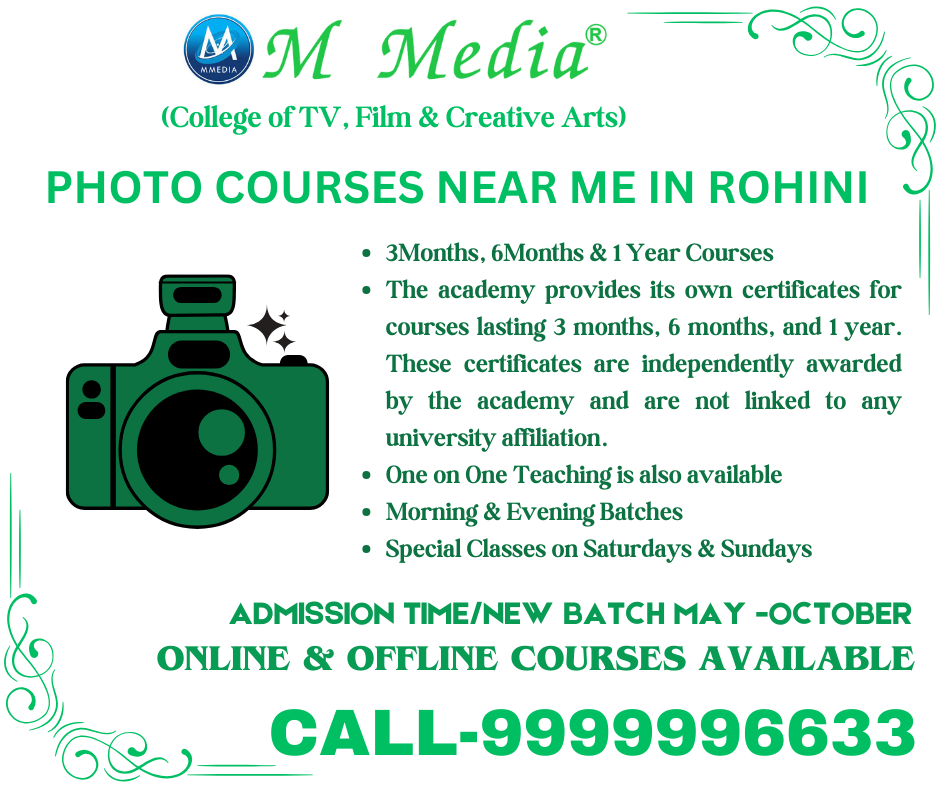
INTRODUCTION:
Photo Courses Near Me In Rohini, photography is more than just pointing a camera and clicking—it’s about storytelling, capturing emotions, and freezing moments in time. Photo courses are designed to help enthusiasts and professionals alike understand the art and science of photography.
Whether you’re a beginner seeking to grasp the fundamentals or a seasoned photographer looking to refine your craft, photo courses provide structured guidance, hands-on training, and a community of like-minded learners.
IMPORTANCE:
1. Comprehensive Learning
Photo courses offer a detailed curriculum covering the essentials of photography, from technical camera settings to creative composition techniques.
2. Expert Guidance
Learning from experienced instructors ensures you get insights, tips, and real-world knowledge that can’t be easily found online.
3. Practical Experience
Most courses emphasize practical assignments and projects, allowing you to apply theories in real-world scenarios.
4. Exploring Creativity
Courses encourage students to experiment with different styles, techniques, and perspectives, unlocking hidden creative potential.
5. Skill Enhancement
Whether you’re a beginner or advanced, photo courses help improve skills progressively, enabling steady growth.
6. Understanding Equipment
Students learn how to effectively use cameras, lenses, lighting, and other photography gear for optimal results.
7. Staying Updated with Trends
With photography constantly evolving, courses help students stay current with the latest technologies and industry practices.
BENEFITS:
1. Technical Mastery
Learn the intricacies of shutter speed, aperture, ISO, white balance, and focus, giving you full control over your camera.
2. Improved Composition
Photo courses teach composition techniques like the rule of thirds, framing, leading lines, and symmetry, enhancing the quality of your photos.
3. Confidence Boost
Structured training builds confidence, empowering you to take on diverse photography challenges and projects.
4. Hands-On Learning
Practical assignments and real-life shooting experiences make learning engaging and impactful.
5. Diverse Photography Genres
Explore and practice different photography styles, such as portrait, landscape, wildlife, and street photography.
6. Post-Processing Skills
Photo courses often include editing training, teaching tools like Adobe Lightroom and Photoshop to refine and enhance your images.
7. Networking Opportunities
Meet fellow photography enthusiasts, mentors, and professionals who can inspire and guide you in your journey.
8. Career Advancement
For aspiring photographers, courses provide certifications, portfolios, and industry connections, opening doors to professional opportunities.
9. Time Efficiency
A structured learning approach saves time compared to self-learning, enabling faster skill development.
10. Creative Expression
Photography allows you to tell stories and express emotions visually, and courses sharpen this ability.
11. Portfolio Development
Build a professional portfolio through projects and assignments, showcasing your skills to clients or employers.
12. Problem-Solving Skills
Learn to adapt to challenging situations like low-light conditions, fast-moving subjects, or unpredictable weather.
13. Affordable Learning
Photo courses are available in various price ranges, offering affordable options for hobbyists and aspiring professionals.
14. Lifelong Skills
The knowledge and skills acquired are valuable for both personal and professional photography endeavors.
15. Joyful Hobby
For those not pursuing a career, photography courses provide a fulfilling and relaxing hobby.


